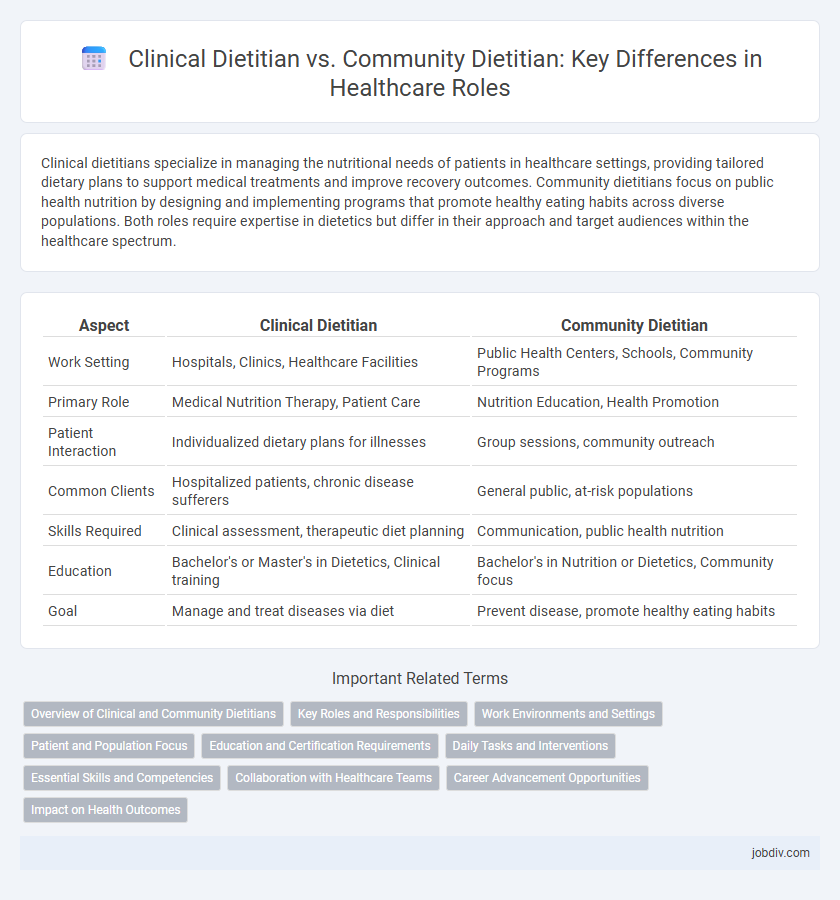Clinical dietitians specialize in managing the nutritional needs of patients in healthcare settings, providing tailored dietary plans to support medical treatments and improve recovery outcomes. Community dietitians focus on public health nutrition by designing and implementing programs that promote healthy eating habits across diverse populations. Both roles require expertise in dietetics but differ in their approach and target audiences within the healthcare spectrum.
Table of Comparison
| Aspect | Clinical Dietitian | Community Dietitian |
|---|---|---|
| Work Setting | Hospitals, Clinics, Healthcare Facilities | Public Health Centers, Schools, Community Programs |
| Primary Role | Medical Nutrition Therapy, Patient Care | Nutrition Education, Health Promotion |
| Patient Interaction | Individualized dietary plans for illnesses | Group sessions, community outreach |
| Common Clients | Hospitalized patients, chronic disease sufferers | General public, at-risk populations |
| Skills Required | Clinical assessment, therapeutic diet planning | Communication, public health nutrition |
| Education | Bachelor's or Master's in Dietetics, Clinical training | Bachelor's in Nutrition or Dietetics, Community focus |
| Goal | Manage and treat diseases via diet | Prevent disease, promote healthy eating habits |
Overview of Clinical and Community Dietitians
Clinical dietitians specialize in providing nutritional care to patients within healthcare settings, such as hospitals and clinics, managing chronic diseases and developing tailored diet plans. Community dietitians focus on public health by promoting nutrition education and healthy eating habits in populations through outreach programs and policy development. Both roles require registered dietitian credentials but differ in work environments and target populations, with clinical dietitians concentrating on individual patient care and community dietitians addressing broader population health initiatives.
Key Roles and Responsibilities
Clinical dietitians specialize in assessing, diagnosing, and treating nutritional problems in hospital or healthcare settings, focusing on patient-specific dietary interventions to support medical treatments. Community dietitians develop and implement nutrition programs aimed at improving public health, conducting outreach, education, and preventive care across diverse populations. Both roles require expertise in nutrition science, but clinical dietitians work primarily with individuals in clinical environments, whereas community dietitians emphasize population-wide health outcomes.
Work Environments and Settings
Clinical dietitians primarily work in hospitals, rehabilitation centers, and outpatient clinics where they provide individualized nutritional care to patients with specific medical conditions. Community dietitians operate in public health departments, schools, and nonprofit organizations, focusing on population-based nutrition programs and preventive services. Both roles require collaboration with healthcare professionals, but clinical dietitians emphasize direct patient care while community dietitians engage in education and outreach efforts.
Patient and Population Focus
Clinical dietitians specialize in individualized patient care within healthcare settings, providing tailored nutrition therapy to manage specific medical conditions. Community dietitians focus on population health by designing and implementing nutrition programs that promote wellness and prevent disease across diverse groups. Both roles are essential for optimizing nutritional outcomes, with clinical dietitians addressing acute needs and community dietitians targeting broader public health improvements.
Education and Certification Requirements
Clinical dietitians must obtain a Bachelor's degree in dietetics, nutrition, or a related field, complete supervised clinical training, and earn Registered Dietitian Nutritionist (RDN) certification through the Commission on Dietetic Registration (CDR). Community dietitians typically hold similar educational qualifications but focus more on public health nutrition, requiring additional knowledge in community health and often obtaining credentials such as Certified Nutrition Specialist (CNS) or public health certifications. Both roles demand state licensure or certification to practice, with clinical dietitians emphasizing clinical competencies and community dietitians prioritizing population-based nutrition strategies.
Daily Tasks and Interventions
Clinical dietitians assess patients' nutritional status, develop individualized meal plans, and collaborate with healthcare teams to manage medical conditions such as diabetes, renal disease, or malnutrition. Community dietitians implement public health programs, conduct nutrition education workshops, and promote healthy eating habits to prevent chronic diseases within populations. Both roles require monitoring dietary progress and adjusting interventions, but clinical dietitians focus on direct patient care while community dietitians emphasize population-level nutrition strategies.
Essential Skills and Competencies
Clinical dietitians require expertise in medical nutrition therapy, critical thinking, and patient assessment to manage complex health conditions in hospitals or healthcare settings. Community dietitians excel in program planning, public health nutrition, and communication skills to promote healthy eating behaviors across diverse populations. Both roles demand strong knowledge of nutrition science, cultural competence, and the ability to tailor interventions for individual or group needs.
Collaboration with Healthcare Teams
Collaboration between clinical dietitians and community dietitians enhances patient care by integrating specialized nutritional assessments and public health strategies across healthcare settings. Clinical dietitians work closely with hospital-based multidisciplinary teams to tailor nutrition plans for acute and chronic conditions, while community dietitians coordinate with primary care providers and public health agencies to implement preventative nutrition programs. This synergy ensures cohesive healthcare delivery, improving patient outcomes through comprehensive dietary support.
Career Advancement Opportunities
Clinical dietitians often advance by specializing in areas such as renal nutrition, oncology, or critical care, gaining certifications and leadership roles within hospital settings. Community dietitians typically progress through public health program management, policy advocacy, or expanding outreach services, often influencing large population health outcomes. Both career paths offer opportunities for research involvement, but clinical roles emphasize acute patient care expertise while community roles prioritize preventive nutrition strategies.
Impact on Health Outcomes
Clinical dietitians improve health outcomes by providing personalized nutrition therapy for patients with chronic diseases, enhancing recovery and managing symptoms in hospital or clinical settings. Community dietitians focus on preventive health by designing public nutrition programs that reduce the prevalence of diet-related diseases across populations. Both roles are crucial in reducing healthcare costs and improving overall public health through targeted nutritional interventions.
Clinical Dietitian vs Community Dietitian Infographic

 jobdiv.com
jobdiv.com